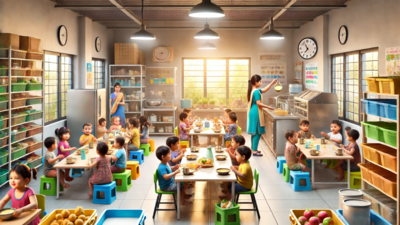HYDERABAD: While the state govt revised the food menu for students in residential schools, anganwadis, which take care of children up to the age of 6, have been left out.
With a menu that prescribes balamrutham which is made milk powder, channa powder, and other supplements to meet the daily nutritional requirements, anganwadi workers are suggesting a revision of the menu and better investment into improving the infrastructure of anganwadis to prevent any potential food contamination for infants and kids.
“We’ve been serving the same processed foods for years now. Fresh milk, fruits, and vegetables would be much better for the children’s growth and development. Often, the supplies arrive late, and we struggle to maintain the quality of stored items in our limited facilities,” said Saralamma, an anganwadi worker from Secunderabad.
Another worker highlighted the infrastructure challenges: “Our centre lacks proper storage facilities and kitchen equipment. During monsoons, we face severe difficulties in keeping the food items dry and preventing spoilage. We need better buildings with modern amenities to ensure food safety for these young children.”
Educational experts emphasised the need for immediate intervention. Venkat Reddy, National Convener of MV Foundation, said, “The first six years are crucial for a child’s physical and cognitive development. The current menu relies heavily on processed foods, which may not provide the optimal nutrition needed during these formative years. A scientific review of dietary requirements is long overdue.”
“Besides menu revision, there’s an urgent need to address the staff shortage in anganwadis,” said Ganji Venugopal, who heads the Child Rights Protection Forum. “The current worker-to-child ratio is poor, and most anganwadis are running in rented buildings. Additional ayahs would not only ensure better care but also help maintain hygiene standards during food preparation and distribution.”
The state’s anganwadi network serves over 17 lakh children between the age of 7 months and 6 years through over 35,000 centres. TOI could not elicit a response from the commissionerate of women development and child welfare.
Hyderabad Anganwadis Demand Menu Overhaul and Upgraded Infrastructure for Child Nutrition | Hyderabad News

